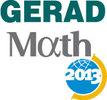HEC Montréal, Canada, May 6 - 8, 2013
2013 Optimization Days
HEC Montréal, Canada, 6 — 8 May 2013

MB6 Transport / Transportation
May 6, 2013 03:30 PM – 05:10 PM
Location: Mary Husny
Chaired by Cinzia Cirillo
4 Presentations
-
 03:30 PM - 03:55 PM
03:30 PM - 03:55 PMA Methodology to Dynamic Assign to Drivers Alternative Paths in Congested Street Networks
The best guidance to drivers on traffic routes within an urban network is of great importance on the structural point of view and organizational traffic in major cities. Using this resource to aid in traffic management becomes increasingly necessary, to the point that contributes to traffic flow on roads. The goal of this work is to show a system that designs the fastest path to drivers in monitored traffic networks. The research is basically divided into three sections: use of algorithms to detect similarity of strings to increase efficiency in the comparisons of the plates read by electronic surveillance equipment, methods to forecast travel time of paths between adjacent vertices of the monitored network, and finally, the calculation of the shortest route between points of the network by a using multilayered Dijkstra algorithm here developed. The results obtained in the implementation of the system is highly satisfactory, considering the increasing efficiency in obtaining the real identification of the plates of vehicles detected between two adjacent vertices of the network, also because of the recent improvements in forecasting methods of traffic conditions on time and adaptation of a shortest path algorithm to the reality. The results of this work can be used to make a better evaluation to the Origin-Destination matrix traffic of the city. This work was developed with the data and support of TRANA Construções Ltda, a company that is responsible to monitor the traffic in the city of Fortaleza/CE.
-
 03:55 PM - 04:20 PM
03:55 PM - 04:20 PMEnchère combinatoire double basée sur la réputation pour l'approvisionnement des services de transport
Une enchère combinatoire de transport routier permet aux expéditeurs et aux transporteurs d’économiser des coûts de transport. Nous proposons un modèle d'enchère combinatoire double basée sur la réputation dans lequel la détermination des transporteurs gagnants se base sur le prix et sur d'autres attributs représentant la qualité de service fournie.
-
 04:20 PM - 04:45 PM
04:20 PM - 04:45 PMDynamic Discrete Choice Model for Railway Ticket Cancellation and Exchange Behavior
The increasing use of internet as a major ticket distribution channel has resulted in passengers becoming more strategic to fare policy. This potentially induces passengers to book the ticket well in advance in order to obtain a lower fare ticket, and later adjust their ticket when they are sure about trip scheduling.
In this presentation, we propose an inter-temporal choice model of ticket cancellation and exchange for railway passengers where customers are assumed to be forward looking agents. A dynamic discrete choice model (DDCM) is applied to predict the timing in which ticket exchange or cancellation occurs in response to fare and trip schedule uncertainty. Passengers’ decisions involve a two steps process. First, the passenger decides whether to keep or adjust the ticket. Once the decision to adjust the ticket has been made, the passenger has the choice to cancel the ticket or to change departure time. The problem is formulated as an optimal stopping problem, and a two steps look-ahead policy is adopted to approximate the dynamic programming problem. -
 04:45 PM - 05:10 PM
04:45 PM - 05:10 PMTransport et disparités régionales au Maroc
Cet article tente d’examiner la relation entre les infrastructures de transport et la croissance économique, ainsi que leur éventuel rôle dans la réduction des disparités régionales. Sur un échantillon de 16 régions marocaines sur la période 2000-2008. Les résultats des estimations économétriques soutiennent que les infrastructures de transport influencent positivement la croissance économique sans permettre aux régions pauvres de rattraper les régions riches

